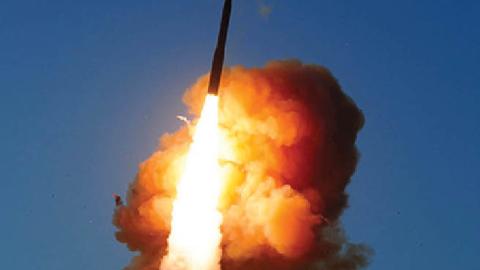This past Monday, Admiral Charles Richard, Commander of the United States Strategic Command, pushed back on the small but vocal disarmament advocacy clerisy who are trying to pressure the incoming Biden administration to eliminate the Ground-Based Strategic Deterrent (GBSD) program. While on a Zoom call with the Defense Writers Group, Adm Richard remarked, “I don’t understand frankly how someone in a think tank who actually doesn’t have their hands on the missile, looking at the parts, the cables, all the pieces inside” is qualified to make such recommendations.
The authors humbly disagree with the Admiral on this point. You don’t need to put your hands on the physically atrophying cables or subject yourself to the unsafe and decaying launch control facilities to fully appreciate the necessity for modernizing the most responsive leg of the nuclear triad. Even those of us in think tank world should be able to appreciate the pragmatism embodied in the GBSD program to protect the homeland and our allies in a cost-effective, threat-informed, and stabilizing manner.
GBSD is meant to replace the Minuteman III intercontinental ballistic missile system (ICBM) system, which first entered service in 1970 and has been extended well beyond its original service life. The current Minuteman III system has been service life extended several times since its deployment and, according to GAO reports, is experiencing challenges “related to aging facilities, aging infrastructure, and parts obsolescence.” Because of the extent of the asset and facility attrition in this 50-year-old weapon system, Air Force officials have warned that the Minuteman III will be “unable to meet full mission requirements should deployment be required” much longer. The reality is that choosing not to pursue GBSD, given the cost and difficulty of attempting yet another service life extension of Minuteman III, is choosing to give up the triad's land-based missile leg.
Opponents of GBSD consistently make a series of poorly reasoned arguments for eliminating the triad's land-based leg, and, as the saying goes, these points are so wrong, even the opposite wouldn’t be true.
The triad's land-based leg is the least expensive leg of the triad to operate and maintain over its lifetime. It does not require large crews or expensive fuel and maintenance costs, like nuclear-powered submarines or heavy bombers. GBSD does not require overseas basing or overflight rights, nor does it require large and expensive fleets of aerial refueling tankers, as does the bomber force. It does not assume that an adversary will forever be unable to locate our submarines at sea, which, given the state of technology advancement –including artificial intelligence and “big data” – is not a safe assumption into the future.
ICBMs remain consistent, visible and responsible mainstays of our nuclear deterrent. The only challenge that ICBMs now face is the failure to modernize them as planned, but this would result from policymakers’ will, not any change in the global threat or design or mechanical failure.
In particular, ICBMs and GBSD are stabilizing to the international order that the Biden Administration will inherit and seek to improve. Our allies, specifically those in NATO and the Indo-Pacific, depend upon the safe, secure, and credible nuclear deterrent that the U.S. extends to them as foundational to their security.
The incoming Biden Administration, which seeks to improve the nation’s standing among its allies, would do well to support a strong modernized nuclear deterrent – including full support of GBSD – that is so vital to U.S. allies (many of which have foresworn their own nuclear weapons because we promised them the security made possible by extending our deterrent).
Lastly, we give much credit to previous Democratic administrations that started out with the admirable goal of eliminating nuclear weapons and ultimately realized such a vision, given current and likely future security realities, is folly.
The role, risks, funding, and programmatic questions associated with nuclear weapons capabilities is a legitimate and necessary public discourse that anybody in civil society should be welcome to contribute to, whether from a think tank, within the government, or in defense industry. But the reality is that our strategic competitors are also watching these debates and often interfere in them. Even those guided by the best of intentions must understand that their complicity in the erosion of a credible nuclear deterrent will only invite continued development and deployment of nuclear weapons by our adversaries that can end our way of life and that of our allies.
These two think tankers believe GBSD remains an integral part of our nuclear deterrent. There is a term for a decision by the United States to choose to fail to modernize its ICBM force, while Russia and China are actively modernizing theirs: unilateral disarmament.
Read in RealClear Defense
















